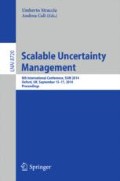Abstract
In this paper we introduce polyhedral labellings associated to an argumentation framework. The name suggests the use of ideas from Polyhedral Combinatorics, an important topic in Combinatorial Optimization, mainly concerned with encoding combinatorial problems by means of systems of linear equations and inequalities, making these problems accessible to linear programming techniques. A polyhedral labelling for an argumentation framework AF = (A,D) is a polytope P AF , that is, a bounded set of solutions x ∈ ℝA (x a is the label of the argument a ∈ A), to a system of linear constraints, such that the set of integral vectors in P AF are exactly the incidence vectors of some specific type of Dung’s extensions. The linear constraints vary from the obvious x a = 1 for each non attacked argument a, or x a + x b ≤ 1 for each attack (a,b) ∈ D (in order to assure Dung’s conflict-free condition), to more deep inequalities of the form ”the sum of the label of an argument and the labels of all its attackers is at least 1” or if (b,a) is an attack then ”the label of a is not greater than the sum of the labels of all attackers of b”.
Access this chapter
Tax calculation will be finalised at checkout
Purchases are for personal use only
Preview
Unable to display preview. Download preview PDF.
References
Baroni, P., Giacomin, M.: On principle-based evaluation of extension-based argumentation semantics. Artificial Intelligence 171, 675–700 (2007)
Bell, C., Nerode, A., Ng, R.T., Subrahmanian, V.S.: Mixed integer programming methods for computing nonmonotonic deductive databases. Journal of ACM 41, 1178–1215 (1994)
Bench-Capon, T.: Persuasion in practical argument using value-based argumentation frameworks. Journal of Logic and Computation 13, 429–448 (2003)
Caminada, M.: On the issue of reinstatement in argumentation. In: Fisher, M., van der Hoek, W., Konev, B., Lisitsa, A. (eds.) JELIA 2006. LNCS (LNAI), vol. 4160, pp. 111–123. Springer, Heidelberg (2006)
Dung, P.M.: On the acceptability of arguments and its fundamental role in nonmonotonic reasoning, logic programming and n-person games. Artificial Intelligence 77, 321–357 (1995)
Gabbay, D.: Introducing equational semantics for argumentation networks. In: Liu, W. (ed.) ECSQARU 2011. LNCS, vol. 6717, pp. 19–35. Springer, Heidelberg (2011)
Gabbay, D.: An equational approach to argumentation networks. Argumentation and Computation 3(2-3) (2012)
Gabbay, D.: The equational approach to cf2 semantics. In: Proc. of COMMA 2012, pp. 141–152 (2012)
Gratie, C., Florea, A.M.: Fuzzy labeling for argumentation frameworks. In: McBurney, P., Parsons, S., Rahwan, I. (eds.) ArgMAS 2011. LNCS, vol. 7543, pp. 1–8. Springer, Heidelberg (2012)
Khachiyan, L.G.: A polynomial algorithm in linear programmming. Soviet Mathematics Doklady 20, 191–194 (1979)
Li, R., Zhou, D., Du, D.: Satisfiability and integer programming as complementary tools. In: Proc. of ASPDAC 2004 (2004)
Liu, G., Janhunen, T., Niemelä, I.: Answer set programming via mixed integer programming. In: Proc. of KR 2012 (2012)
Lowe, J.: CPLEX 10 Solver Manual. GAMS Development Corporation (2012)
Pollock, J.L.: Cognitive Carpentry. A Blueprint for How to Build a Person. MIT Press, Cambridge (1995)
Rahwan, I., Simari, G. (eds.): Argumentation in Artificial Intelligence. Springer (2009)
Schrijver, A.: Combinatorial Optimization - Polyhedra and Efficiency. Springer (2003)
Author information
Authors and Affiliations
Editor information
Editors and Affiliations
Rights and permissions
Copyright information
© 2014 Springer International Publishing Switzerland
About this paper
Cite this paper
Croitoru, C. (2014). Polyhedral Labellings for Argumentation Frameworks. In: Straccia, U., Calì, A. (eds) Scalable Uncertainty Management. SUM 2014. Lecture Notes in Computer Science(), vol 8720. Springer, Cham. https://doi.org/10.1007/978-3-319-11508-5_8
Download citation
DOI: https://doi.org/10.1007/978-3-319-11508-5_8
Publisher Name: Springer, Cham
Print ISBN: 978-3-319-11507-8
Online ISBN: 978-3-319-11508-5
eBook Packages: Computer ScienceComputer Science (R0)

